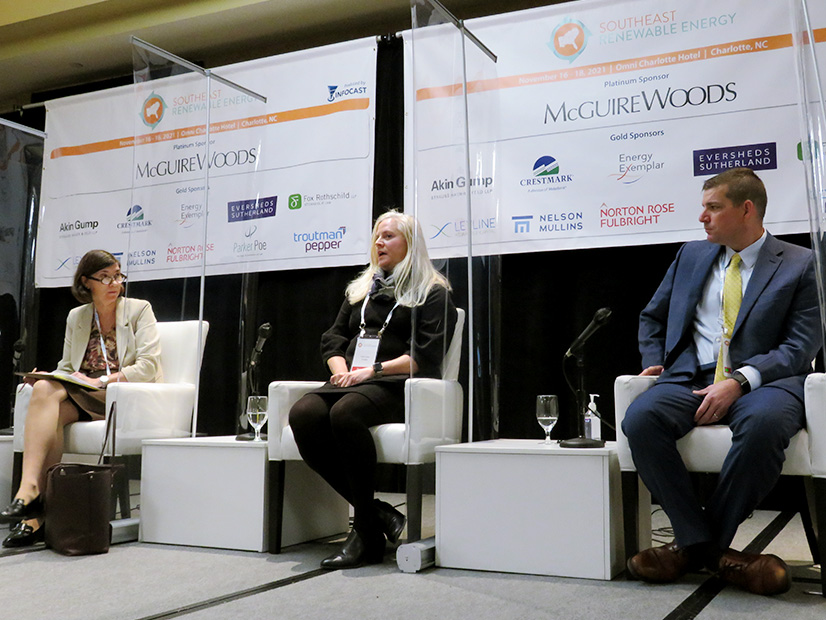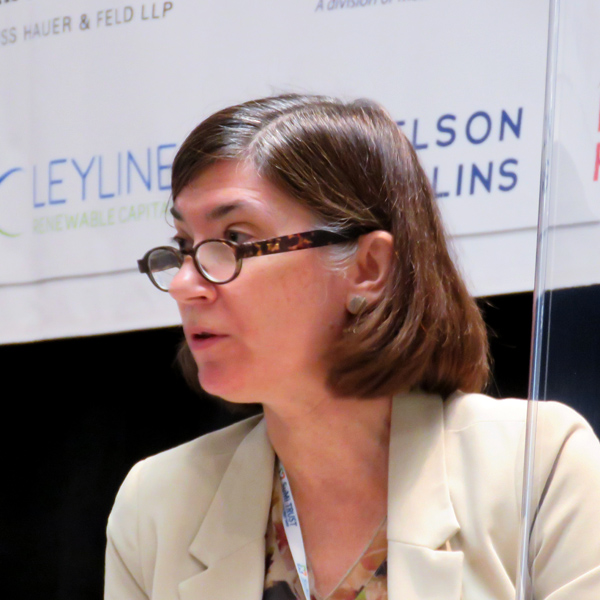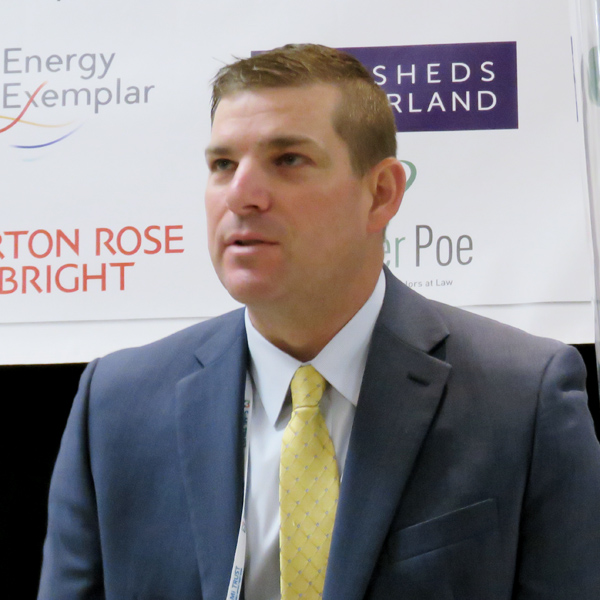
CHARLOTTE, N.C. — Virginia’s landmark Clean Economy Act is unlikely to face major changes any time soon despite Republicans’ victories in the Nov. 2 election, speakers told attendee of Infocast’s Southeast Renewable Energy Conference last week.
Although Republicans gained control of the House of Delegates as well as the governorship and lieutenant governor’s post, Democrats will continue to hold a 21-19 edge in the Senate, which does not face re-election until 2023.
 Cliona Mary Robb, Thompson McMullan | © RTO Insider LLC
Cliona Mary Robb, Thompson McMullan | © RTO Insider LLC“The numbers that really matter are not the governor, not lieutenant governor, not the House numbers, but it’s the Senate Commerce and Labor [Committee], where the composition is 12 Democrats and three Republicans,” said Cliona Mary Robb, director of law firm ThompsonMcMullan and chair of the Virginia Renewable Energy Alliance. “I would posit to you that … any massive overhaul legislation is not going to get through that roadblock.”
Karla Loeb, policy adviser for Arcadia, an energy software company, and former chief policy and development officer for Sigora Solar, agreed, noting that the VCEA had bipartisan support in both houses of the legislature, including from Terry Kilgore, the incoming House majority leader. “Yes, there were deals made, as there [always] are. But you know, he’s already put his name [behind the bill]. For the past four years, [he] has hosted renewable energy conferences and get-togethers. And he believes that this is coming. Southwestern Virginia, which is his territory, is very excited about the opportunity for clean energy deployment.”
 Karla Loeb, Arcadia | © RTO Insider LLC
Karla Loeb, Arcadia | © RTO Insider LLC“This legislation was not passed by just the renewable energy industry,” she added. “We worked in concert with Dominion [Energy] [NYSE:D], with [Appalachian Power] [NASDAQ:AEP], on a day-to-day basis to get consensus [on] a piece of legislation that we can all live with. [The utilities] are already procuring their [renewable generation] targets. They’re already making their plans. … The ship has left the port.”
Approved in April 2020, the VCEA requires Virginia to close most of its coal-fired generation by 2024 and makes it the first Southern state to adopt a 100% clean energy standard. It established goals of 5,200 MW of offshore wind and 16,100 MW of solar and onshore wind as “in the public interest.” (See Va. 1st Southern State with 100% Clean Energy Target.)
The GOP victories showed that predictions that the commonwealth had become a reliably blue state were incorrect and raised questions about its commitment to reaching 100% carbon-free electricity by 2050.
 Scott Gaskill, Dominion Energy | © RTO Insider LLC
Scott Gaskill, Dominion Energy | © RTO Insider LLCEnergy policy was not a central issue in Republican Glenn Youngkin’s victory in the gubernatorial race, although he and Democrat Terry McAuliffe differed sharply on the VCEA, with McAuliffe calling for eliminating fossil fuel power by 2035, while Youngkin said even the law’s 2050 target is unrealistic. (See GOP Wins in Va. Raise Questions About State’s Climate Policy.)
Scott Gaskill, Dominion’s director of regulatory affairs, agreed that major changes to the law are unlikely.
“Clearly, there’s going to be change in the administration in terms of [the Department of Environmental Quality], the Department of Commerce. Those types of things could have some tangential impacts, but a wholesale rollback of VCEA doesn’t seem to be in the cards, as long as the Senate” remains in Democratic control, he said.
Limited Supply, Local Zoning Present Obstacles to Solar Goals
But Gaskill said Dominion’s efforts to meet its renewable procurement targets are being hampered by local opposition to utility-scale solar and the backlog in PJM’s interconnection queue.
“When we’re talking about 6 to 8 GW of new solar, that’s a lot of land, and you’re already starting to see some pushback from localities,” he said.
The PJM queue is “quite frankly … a bit of a mess right now,” he said. “Their processes worked very well for years [when there were] a few large units coming in. … Now you’ve got thousands of relatively small [generating projects], and the process isn’t geared towards that.
“We just filed for 1,100 MW [with the State Corporation Commission]. I mean, that was almost every project that we could find.”
Implementation Challenges
Loeb said that while much attention was paid to legislative battles over the VCEA and Congress’ infrastructure and Build Back Better bills, the challenges of implementing the legislation should not be minimized.
“It’s not just a one and done. The [renewable portfolio standard] has annual filings, on top of [integrated resource plans]; storage, again, also regular filings. And so we’re just creating docket after docket after docket, and then, compounding that, with the infrastructure plan, and God willing, Build Back Better … it’s just going to compound things,” she said. “If you guys have teenagers or college-age students, tell them to please become regulatory attorneys, because we do not have enough of them. We do not have enough electrical engineers. We’re grossly understaffed for the transition that we’re about to embark on.”
Robb said persuading local governments to approve solar projects will be key to meeting the VCEA’s goals. “And right now we’re finding them not as friendly as certainly as I’d like them to be,” she said. “You’re [asking permission for] turning over farmland to solar farms for 20, 30, I’ve seen 40 years. … There’s other roadblocks, but nothing happens if you can’t get it … through the local board of supervisors. So I think that’s where we want to win over the hearts and minds.”



